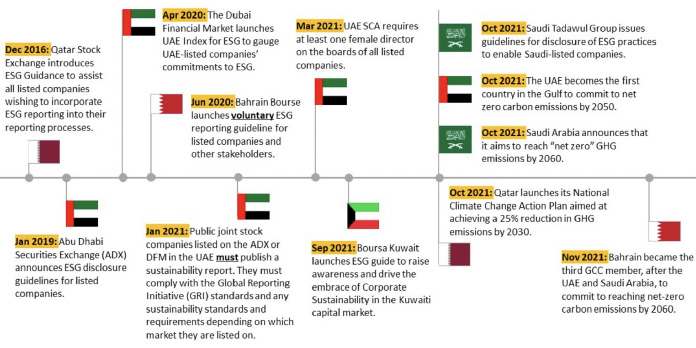Chartered Manager, Eman Deabil (DipESG, PfMP, IPMO-P, SIP), explores the rise of the Chief Sustainability Officer (CSO) role worldwide and in our region based on data availability.
Sustainability has become an increasingly important topic in recent years. With sustainability being the talk of the town, businesses around the world are recognising the need to take serious actions to address critical challenges such as climate change, social justice, equality, diversity, and inclusion. One way that organisations are approaching this is by appointing a Chief Sustainability Officer (CSO) to oversee their sustainability practices.
The First Chief Sustainability Officer (CSO)
The role of the Chief Sustainability Officer is to oversee a company’s sustainability practices, including environmental, social, and governance (ESG) initiatives and metrics. This can include developing and monitoring sustainability framework, strategies, setting objectives and targets, and ensuring compliance with relevant regulations and reporting standards. The CSO is also responsible for engaging with relevant stakeholders, including investors, board of directors, employees, customers, and communities, to ensure that sustainability efforts and outcomes are aligned with their expectations and needs.
It’s worth mentioning that the role/title is not new as it’s been around for approximately 20 years! However, the role of CSOs might be new in this part of the world.
In 2004, Linda Fisher was the first person to receive the title of ‘Chief Sustainability Officer’ at DuPont. By 2011, there were 29 CSOs in the USA’s publicly listed companies. Ms. Fisher holds a Bachelor of Arts, Master of Business Administration (MBA) and a doctorate degree in Law. She worked for the US Environmental Protection Agency (EPA) as a Deputy Administrator before joining DuPont as a CSO.
According to a 2023 survey conducted by EY, 81 percent of the respondents confirmed that their organisations have a CSO or equivalent role. While 69 percent of the ones who responded that they don’t have a CSO confirmed that their organisations are planning to hire one within six to 12 months.
* Reference: C-suite Insights: Sustainability and ESG Trends Index (2023).
CSOs in Bahrain
According to various companies’ websites, annual reports and recent news, seven out of 43 listed companies in Bahrain have CSOs appointed at an executive management (c-suite level). 29 percent are standalone CSOs and 71 percent hold the position of CSO and another role.
 As a matter of fact, the role of CSOs is evolving in the GCC overall as companies recognise the importance of sustainability in achieving their long-term economic vision. Here are some of the key indications:
As a matter of fact, the role of CSOs is evolving in the GCC overall as companies recognise the importance of sustainability in achieving their long-term economic vision. Here are some of the key indications:
1. Increasing focus on ESG reporting and disclosure: Many organisations in the GCC are now recognising the importance of Environmental, Social, and Governance (ESG) reporting and disclosure. CSOs are playing a key role in ensuring that organizations are meeting their ESG reporting requirements.
2. Integration of sustainability into corporate strategy: Organisations in the GCC recognised that sustainability is not a ‘nice to have’ part but an integral part of a long-term strategy. CSOs are increasingly working closely and aligning efforts with senior management to integrate sustainability considerations into core business operations and decision-making processes.
3. Focus on sustainable finance: There is a growing interest in sustainable finance in the GCC, including green bonds, sustainability-linked loans, and other forms of sustainable finance. CSOs are playing a key role in guiding organisations towards sustainable finance options and ensuring that sustainability considerations are integrated into investment decisions.
4. Regulatory frameworks: In recent years, several GCC countries have introduced regulatory frameworks aimed at promoting sustainability and ESG reporting. Bahrain introduced a voluntary ESG reporting guideline for listed companies in 2020. CSOs are playing a key role in ensuring compliance with these regulations and in developing comprehensive ESG strategies that go beyond mere compliance. The infographic below illustrates the timeline of the key milestones:
 5. Focus on social sustainability: While environmental sustainability is a key focus for many CSOs in the GCC, there is also a growing emphasis on social sustainability. This includes issues such as labour rights, diversity and inclusion, and community engagement. CSOs are working to ensure that organisations contribute to the social development of the region.
5. Focus on social sustainability: While environmental sustainability is a key focus for many CSOs in the GCC, there is also a growing emphasis on social sustainability. This includes issues such as labour rights, diversity and inclusion, and community engagement. CSOs are working to ensure that organisations contribute to the social development of the region.
 The rise of the Chief Sustainability Officer (CSO) is a clear indication of the growing importance of sustainability in today’s business landscape. As organisations across the globe face increasing pressure to address sustainability issues, CSOs will play a critical role in driving these efforts. While the role is still relatively new, it has already become a vital part of the corporate landscape, and its importance is only set to grow in the years ahead; therefore, it’s essential to groom and grow the right talents that can handle this role with extreme integrity and professionalism.
The rise of the Chief Sustainability Officer (CSO) is a clear indication of the growing importance of sustainability in today’s business landscape. As organisations across the globe face increasing pressure to address sustainability issues, CSOs will play a critical role in driving these efforts. While the role is still relatively new, it has already become a vital part of the corporate landscape, and its importance is only set to grow in the years ahead; therefore, it’s essential to groom and grow the right talents that can handle this role with extreme integrity and professionalism.
Eman Deabil is the first person to be DipESG-certified in Bahrain from The Corporate Governance Institute.





